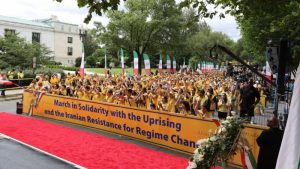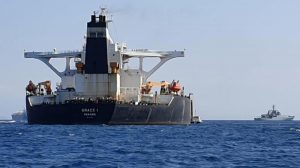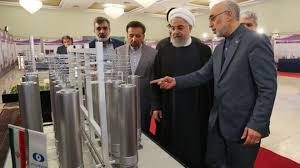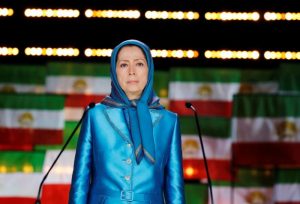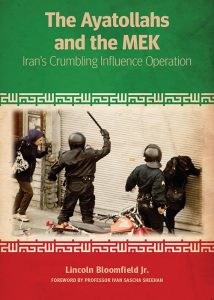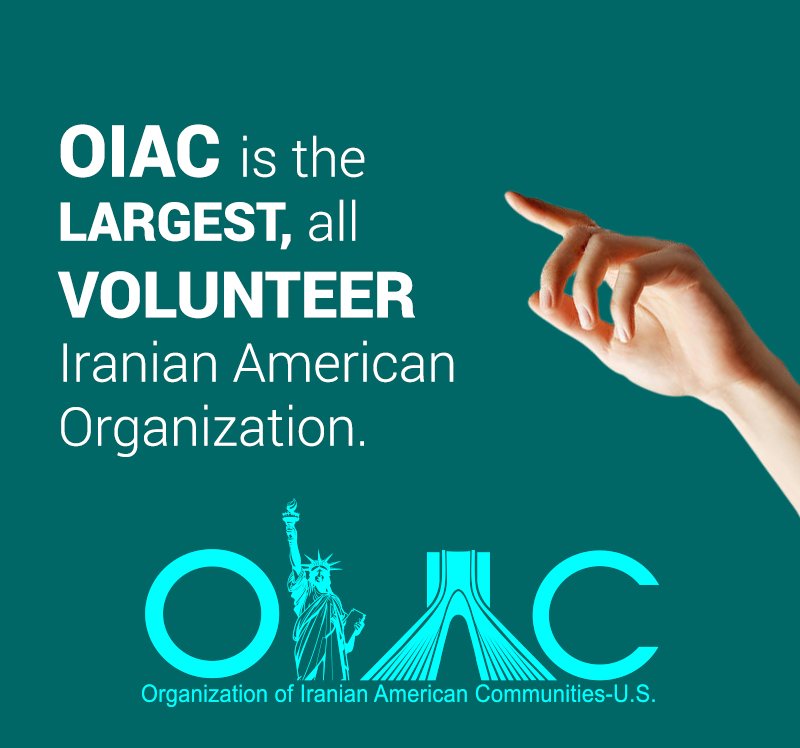Thousands in Berlin protest Iran’s political repression
Opponents of Iran’s theocratic government have rallied in Berlin to protest the country’s human rights record. They urged potential investors not to support the regime and said the West should not do deals with Tehran.
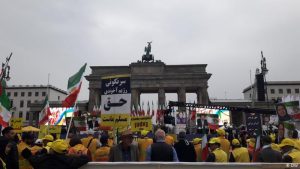
Thousands gathered in Berlin’s government quarter on Saturday to protest the Iranian government’s use of draconian measures against its opponents.
Protesters, who carried pre-Islamic Revolution flags and balloons in the national colors of green, white and red, voiced opposition to both the use of the death penalty and torture in prison.
Read more: Iran’s Nasrin Sotoudeh — from human rights lawyer to hunger striker
“Down with the regime” was among the slogans chanted, along with: “The West should not enter into any compromise with religious fascism.”
A message from Maryam Rajavi, leader of the People’s Mujahedin of Iran, a controversial group that seeks to topple the regime, was played to the crowd.
In it, Rajavi condemned the Iranian government for carrying out acts of terror in other countries. Among them, she said, were the Mykonos restaurant assassinations, which targeted Iranian-Kurdish opposition leaders. Rajavi called on Chancellor Angela Merkel to send a delegation to Iran to assess the state of prisons and Iran’s claims that there are no political prisoners and no torture in its jails.
Javad Dabiran, Berlin representative of the National Council of Resistance of Iran, told DW’s Farsi service that the Iranian government — under pressure at a national and international level — was increasingly resorting to the use of the death penalty and suppression of minority rights.
“This regime cannot be reformed,” said Dabiran. “We want to convey the message that any investment that seeks to change this regime from within is a mistake and that’s what Europeans are doing. For this reason, we’re calling on Germany and the European Union to rethink their policy, because it is catastrophic.”
Solidarity March for a Free Iran-DC
On Friday June 21, 2019, Several thousand Iranian Americans from 40 U.S. States held a large rally beginning at the Department of State in Washington, DC and marched to the White House. Rally participants expressed support for people’s uprising for regime change in Iran and called for a firm policy on the Iranian regime to counter its increased repression at home and aggression in the region.
We invite you to check out a detailed report, and the text of Congressional bi-partisan support for our rally.
https://oiac.org/solidarity-march-2019/
Gibraltar Seizes Syria-Bound Tanker Thought to Be Carrying Iranian Oil
The New York Times, July 4, 2019
LONDON — The British marines and the port authorities in Gibraltar on Thursday detained a supertanker that was carrying crude oil from Iran to Syria, a violation of European Union sanctions against Syria. The seizure of the ship threatened to raise tensions between Iran and the West.
Spain said the vessel had been detained at the request of the United States, and Iran summoned the British ambassador over what a Foreign Ministry spokesman called an “illegal” seizure.
The Iranian Foreign Ministry spokesman, Seyed Abbas Mousavi, confirmed on Thursday that the detained ship, the Grace 1, was carrying crude oil from Iran, according to Iran’s official Islamic Republic News Agency.
Although President Trump has imposed sanctions to choke off Iran’s exports of oil and petrochemical products, the British and Gibraltar authorities cited not those sanctions but the European Union ones against sanctions on Syria as the reason for detaining the tanker.
“We have reason to believe that the Grace 1 was carrying its shipment of crude oil to the Banyas Refinery in Syria,” Fabian Picardo, the chief minister of Gibraltar, said in a statement. “That refinery is the property of an entity that is subject to European Union sanctions against Syria.”
Spain’s acting foreign minister, Josep Borrell, told Spanish news media that the oil tanker had been seized following “a request from the United States to the United Kingdom.” He said that Spain had been kept informed about the seizure, but offered no details to support his assertion about an American request.
Iran breaches key uranium enrichment limit in nuclear deal
ABC News, July 8, 2019
Iran on Monday began enriching uranium to 4.5%, just breaking the limit set by its nuclear deal with world powers, while it is still seeking a way for Europe to help it bypass U.S. sanctions amid heightened tensions between Tehran and Washington.
The acknowledgement by the spokesman of the Atomic Energy Organization of Iran to The Associated Press shows that the Islamic Republic trying to increase pressure on those still in the 2015 nuclear deal. It also comes just days after Iran acknowledged breaking the 300-kilogram (661-pound) limit on its low-enriched uranium stockpile, another term of the accord.
The International Atomic Energy Agency, the U.N.’s nuclear watchdog, confirmed that Iran surpassed the enrichment threshold. Experts warn that higher enrichment and a growing stockpile could begin to narrow the one-year window Iran would need to have enough material for an atomic weapon, something Iran denies it wants but the deal prevented. While the steps now taken by Iran remain quickly reversible, Europe so far has struggled to respond.
There are fears that a miscalculation in the crisis could explode into open conflict. President Donald Trump, who withdrew the U.S. from the nuclear deal over a year ago and re-imposed crippling economic sanctions on Iran, nearly bombed the country last month after Tehran shot down a U.S. military surveillance drone. Even China, engaged in delicate trade negotiations with the White House, openly criticized America’s policy toward Iran.
Making Sense of The MeK
Quite simply, the MeK believes that, after forty years of active resistance, it has more “skin in the game” than any other personality or faction in the struggle against the Islamic Republic.
Nationalinterest.org, July 4, 2019
To its supporters, it is the most organized and disciplined alternative to the current clerical regime in Tehran, and the only one that is truly capable of establishing a democratic, secular Iran. To its detractors, it represents a fringe element that promotes an unpopular, unworkable vision of Iran’s future.
Even by the notoriously fractious standards of Iranian opposition politics, the Mujahedin e-Khalq (MeK) is a controversial entity—one all too often misunderstood by U.S. policymakers and demonized by its competitors. Yet it is also an important part of any serious conversation about the future of Iran, such as the one now taking place in Washington, DC as the Trump administration’s “maximum pressure” campaign against the Islamic Republic takes hold in earnest.
Who, exactly, are the MeK? The group (also known as the People’s Mojahedin Organization of Iran, or PMOI) has a particularly difficult political history dating back to Iran’s pre-revolutionary era.
Founded in the mid-1960s as a “social justice” movement, the MeK had by the early 1970s embarked upon a wide-ranging campaign against what it viewed as the increasingly corrupt, tyrannical rule of Shah Mohammed Reza Pahlavi. Its activities (from the dissemination of political critiques to plots to sabotage of government targets) paralleled those of the Islamist forces then coalescing around Ayatollah Ruhollah Khomeini. The resulting tactical alignment saw the MeK play a significant part in amplifying the political turmoil that ultimately drove the Shah from power.
Iran to Sell Organs of Death Row Inmates
Ncr-iran.org, July 8, 2019
The organs of death row prisoners in Iran could be pre-sold to buyers under a new law that is heavily condemned by Iran’s Association of Surgeons.
The head of the Iranian regime’s Judiciary, Ebrahim Raeesi, who was involved in the 1988 massacre of 30,000 political prisoners, explained that an article has been included in the criminal justice laws that would allow a convict to “voluntarily offers his or her organ[s] before or after execution”. This would be approved by the judge, the ministry of justice, and the coroners’ office provided there is no medical obstacle that would render the organs unfit.
This law was heavily criticised by Iran’s Association of Surgeons, who described it as “extremely worrying, damaging to our profession and the prestige of Iran in the eyes of the civilised world”.
A professor who works in the liver transplant unit at the so-called ‘Khomeini hospital’ in Tehran and is a member of the American Society of Transplantation told the state-run ISNA news agency that no specialist surgeon would follow the law because “it is immoral and against all the values of our profession”.
“Anyone sentenced to death would not be in a right frame of mind to ‘voluntarily’ offer their organs, unless they are forced to do so under immense pressure. Members of our association of surgeon will never abide by this law.”
Monograph: ‘The Ayatollahs and the MEK – Iran’s Crumbling Influence Operation’
Lincoln J. Bloomfield Jr
June 2019
Ambassador Lincoln J. Bloomfield Jr. has published a new monograph, The Ayatollahs and the MEK–Iran’s Crumbling Influence Operation , through the University of Baltimore College of Public Affairs.
Bloomfield, a former defense and foreign policy official who has served three presidents over five administrations in the Pentagon, the White House and the U.S. State Department, is the author of a 2013 study of the MEK, The Mujahedin-e Khalq (MEK)–Shackled by a Twisted History , also published by the University. The story of this group, which was formed by student intellectuals during the 1960s to oppose the Shah of Iran but became an enemy of the clerical regime of Ayatollah Khomeini after the revolution, was twisted by U.S. officials in a misguided attempt to engage and appease the Iranian government. Bloomfield has also prepared testimonies about the MEK for hearings before the House Committee on Foreign Affairs, Subcommittee on Oversight and Investigations and Subcommittee on the Middle East and South Asia.
Like the 2013 monograph, this work includes a foreword by Ivan Sascha Sheehan, associate professor and executive director of the School of Public and International Affairs in the University of Baltimore’s College of Public Affairs; Sheehan specializes in global terrorism, counterterrorism, U.S. foreign policy, and international conflict management.
We think you will find this report very informative
Donation
501 (c)(3) Tax deductible
Please,
Donate to Organization Of Iranian American Communities
Your donation will help OIAC advocates for a democratic, secular and non-nuclear government in Iran. Founded on the respect for human rights, gender equality, religious and ethnic tolerance, as wells as social, economic justice, and security for America. Our goal is to organize Iranian-American communities in the United States to promote these values.
Thank You,
http://www.oiac-us.com/donation/

